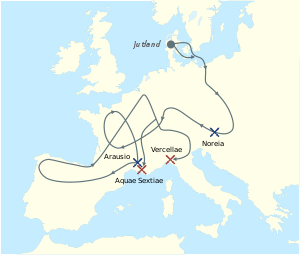Battle of Noreia
| Battle of Noreia | |||||||
|---|---|---|---|---|---|---|---|
| Part of the Cimbrian War | |||||||
 The migrations of the Cimbri and the Teutons. |
|||||||
|
|||||||
| Belligerents | |||||||
|
Noricum |
Cimbri Teutones Ambrones |
||||||
| Commanders and leaders | |||||||
| Gnaeus Papirius Carbo | King Boiorix King Teutobod |
||||||
| Strength | |||||||
| 30,000 | 300,000 | ||||||
| Casualties and losses | |||||||
| 24,000 | unknown | ||||||
The Battle of Noreia in 112 BC, was the opening battle of the Cimbrian War fought between the Roman Republic and the migrating Proto-Germanic tribes, the Cimbri and the Teutons (Teutones). It ended in defeat, and near disaster, for the Romans.
The Cimbri and Teutones left their home lands around the Baltic sea in the Jutland peninsula and Southern Scandinavia. They travelled southeast and encountered the Scordisci with whom they fought. Following their victory over the latter, they arrived at the Danube in Noricum (113 BC) which was home to the Taurisci, allies with Rome. Unable to repel these new invaders, the Taurisci appealed to Rome for assistance. The consul Gnaeus Papirius Carbo responded the following year, leading the legions into Noricum, where he took up a position on the heights near Aquileia.
Carbo ordered them to vacate the territory of the Taurisci at once. The Cimbri had heard many stories from other tribes about the fearsome power of Rome, and after seeing the size of the Roman army and the strength of its position, they complied. However, Carbo was not going to allow enemies of Rome (nor an opportunity to gain a triumph) to escape. He had sent guides, to escort the Cimbri and Teutones to the frontier, however, they were actually going to lead them into an ambush the consul had prepared. But somehow, perhaps due to being warned by their scouts or spies or possibly due to the treachery of one of the guides, the Cimbri became aware of Carbo's plan and, according to Theodor Mommsen:
An engagement took place not far from Noreia in the modern Carinthia, in which the betrayed gained the victory over the betrayer and inflicted on him considerable loss; a storm, which separated the combatants, alone prevented the complete annihilation of the Roman army.
...
Wikipedia
